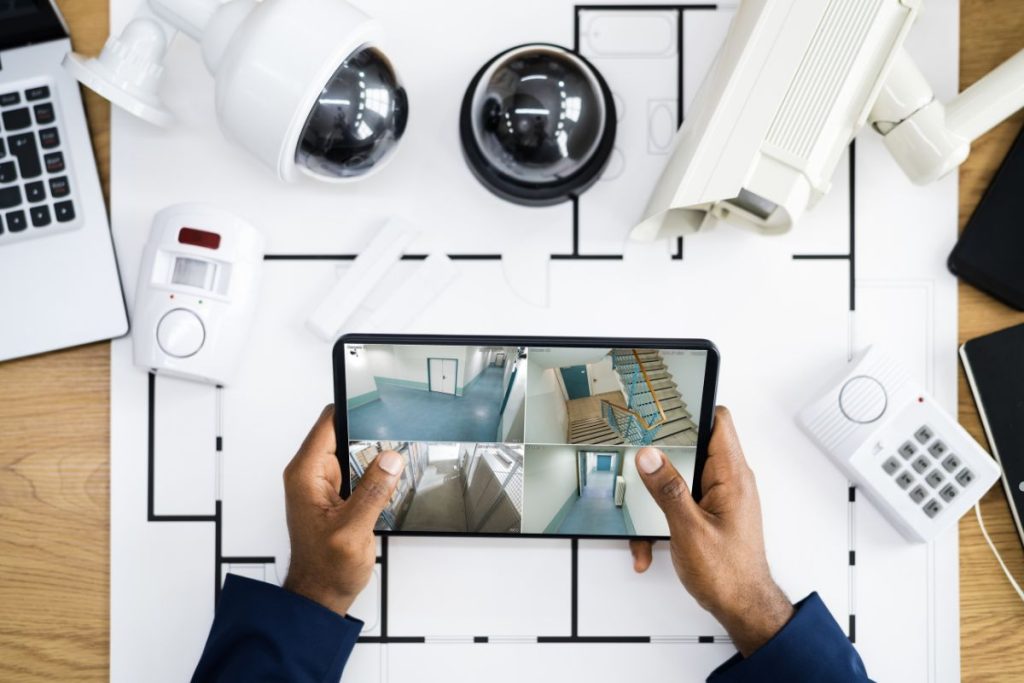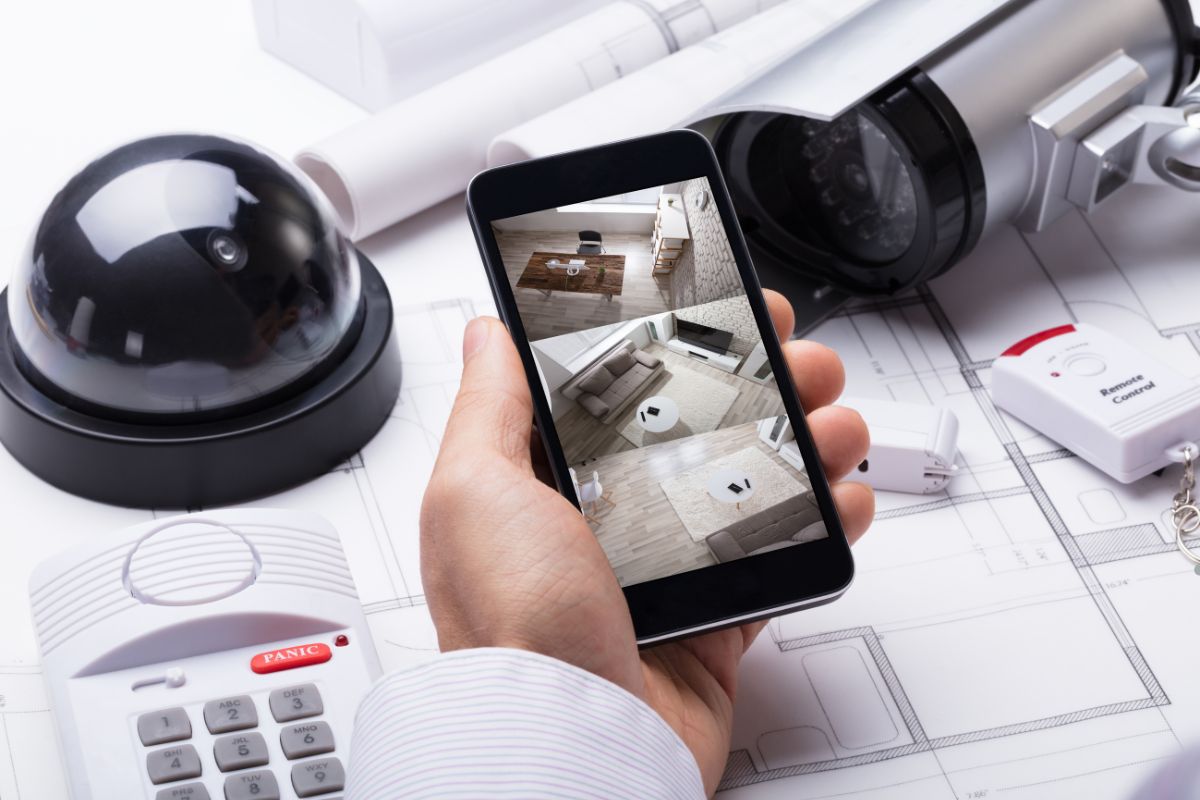
Choosing the right home security system can feel overwhelming, but it’s a crucial step in protecting your family and belongings. From DIY setups to professionally installed systems, wired to wireless options, understanding the different types available empowers you to make an informed decision that fits your needs and budget. This article will guide you through the various home security installation types, helping you find the perfect solution for your peace of mind.
Why Home Security Matters
In today’s world, home security is more important than ever. A security system provides a vital layer of protection against burglaries, fires, and other emergencies. It offers peace of mind, knowing that your home and loved ones are safe and secure. Investing in a home security system is an investment in your family’s well-being and financial security.
Assessing Your Security Needs
Before diving into the different installation types, it’s essential to assess your specific security needs. What are your primary concerns? Are you worried about burglaries, fire hazards, or perhaps monitoring elderly relatives? Understanding your concerns will help you narrow down the options and choose a system that addresses your specific requirements. Conduct a Home Security Assessment of your property.
Factors to Consider
Several factors influence your choice of home security installation. Your budget, the size of your property, your technical skills, and your desired level of monitoring all play a role. If you’re comfortable with technology and prefer a hands-on approach, a DIY system might be a good fit. If you prefer a hassle-free experience and professional support, a professionally installed system might be a better option.
DIY Home Security Installation
DIY home security systems have gained immense popularity in recent years, offering a cost-effective and customizable way to protect your home. These systems typically involve self-installation and monitoring, giving you complete control over your security.
What is DIY Home Security?
DIY home security systems are designed for homeowners who prefer to install and manage their security systems themselves. These systems usually come with pre-configured components, such as sensors, cameras, and a control panel, making installation relatively straightforward.
Pros and Cons of DIY
Pros:
- Cost-Effective: DIY systems are often more affordable than professionally installed systems.
- Customizable: You can choose the components you need and tailor the system to your specific requirements.
- Control: You have complete control over the system and its monitoring.
Cons:
- Installation Challenges: Installation can be time-consuming and may require some technical skills.
- Limited Support: You’re responsible for troubleshooting any issues that arise.
- Security System Limitations: Some DIY systems may have limited features compared to professional systems.
Popular DIY Systems

Several reputable DIY home security systems are available on the market. Some popular options include Ring Alarm, SimpliSafe, and Abode. These systems offer a range of features, including professional monitoring options, making them a versatile choice for homeowners.
Discover our range of professional Our Services to enhance your home security and safety.
Installation Tips & Tricks
- Read the instructions carefully: Before you begin, thoroughly read the installation instructions provided by the manufacturer.
- Plan your sensor placement: Strategically place sensors on doors, windows, and other potential entry points.
- Test the system: After installation, test the system thoroughly to ensure that all components are working correctly.
Keep your home and family safe with our advanced home security solutions! Get 24/7 monitoring, smart alarms, and instant alerts. Don’t wait—secure your home today! Call us now for a free consultation!
Professional Home Security Installation
For homeowners who prefer a hassle-free experience and expert support, professional home security installation is an excellent option. Professional installers handle every aspect of the installation process, from system design to setup and monitoring.
Benefits of Professional Installation
- Expert Installation: Professional installers have the knowledge and experience to install your system correctly and efficiently.
- Security System Design: Professionals can design a custom security system that meets your specific needs.
- Peace of Mind: Knowing that your system is installed correctly and monitored by professionals provides peace of mind.
What to Expect from a Professional Installer
The process of professional installation typically begins with a consultation. A security expert will assess your property, discuss your security concerns, and recommend a suitable system. Once you’ve chosen a system, the installer will schedule an installation appointment.
Types of Professionally Installed Systems
Professional security companies offer a wide range of systems, including monitored alarm systems, security cameras, access control systems, and smart home integration. These systems can be customized to meet the specific needs of your home and family.
Choosing a Reputable Installer
Choosing a reputable and qualified security installer is crucial. Look for a company with a solid reputation, licensed technicians, and positive customer reviews. Ask for references and check online reviews before making a decision. Check online reviews for Security Installer Reviews.
Wired vs. Wireless Security Systems
Wired and wireless security systems are the two primary types of security systems available. Each type has its advantages and disadvantages, making it essential to understand the differences before making a decision.
Wired Security Systems
Wired security systems use physical cables to connect the various components of the system. These systems are known for their reliability and security, as they are less susceptible to interference than wireless systems.
Wireless Security Systems
Wireless security systems use radio frequencies to communicate between components. These systems are easier to install than wired systems, as they don’t require running cables through walls. They offer flexible Smart Security.
Wired vs. Wireless: A Comparison
| Feature | Wired Systems | Wireless Systems |
|---|---|---|
| Reliability | High | Moderate |
| Installation | More complex | Easier |
| Cost | Generally lower | Generally higher |
| Flexibility | Less flexible | More flexible |
Types of Security Equipment

A comprehensive home security system includes various types of equipment, each designed to protect your home in different ways.
Security Cameras
Security cameras are an essential part of any home security system. They provide visual surveillance of your property, allowing you to monitor activity and record evidence of any incidents. Consider installing Outdoor Security Cameras.
Sensors and Detectors
Sensors and detectors are used to detect intrusions, fires, and other emergencies. Door and window sensors trigger an alarm when a door or window is opened, while motion detectors detect movement inside your home.
Control Panels and Keypads
Control panels and keypads are the central hubs of your security system. They allow you to arm and disarm the system, view system status, and receive alerts.
Smart Home Integration
Many modern security systems can be integrated with smart home devices, allowing you to control your security system, lighting, and other home automation features from a single app.
Monitoring Options
Once you’ve installed a security system, you’ll need to decide on a monitoring option. You can choose to self-monitor the system or opt for professional monitoring services.
Self-Monitoring
Self-monitoring involves monitoring the system yourself, using a mobile app or web portal. You’ll receive alerts on your smartphone when the system is triggered and be responsible for contacting the authorities.
Professional Monitoring
Professional monitoring services provide 24/7 monitoring of your security system. When the system is triggered, a trained operator will assess the situation and contact the authorities if necessary.
During a fire emergency, every second matters. While automatic fire detection systems play a critical role, manual pull stations empower building occupants to take immediate action. These easily accessible devices enable you to activate the fire alarm and start the evacuation process, potentially saving lives and reducing damage. Learn more in our detailed guide: The Fire Alarm System’s Manual Activation Hero: What Every Occupant Should Know.
Monitoring Contracts and Fees
Professional monitoring services typically require a contract and involve monthly fees. Be sure to carefully review the terms and conditions of the contract before signing up.
Home Security Installation Types: Choosing the Right Security System for Your Home. Unsure which system is best for you? Call us now for expert advice and find the perfect security solution to protect your home and loved ones!
Cost Considerations
The cost of a home security system can vary widely depending on the type of system, the equipment included, and the monitoring option you choose.
Initial Investment Costs
The initial investment costs typically include the cost of the equipment and installation fees. DIY systems generally have lower initial costs than professionally installed systems.
Recurring Costs
Recurring costs include monthly monitoring fees and maintenance costs. Be sure to factor in these costs when budgeting for a home security system.
Conclusion
Choosing the right home security installation type is a critical decision that can significantly impact your safety and peace of mind. By understanding your needs, exploring the different options, and carefully considering the costs and benefits, you can make an informed choice that protects your home and loved ones.
Making the Right Choice
Take the time to research your options, compare different systems, and consult with security professionals. Don’t hesitate to ask questions and get multiple quotes before making a final decision. The right home security system is an investment in your safety and well-being.
FAQ
What is the best type of home security system?
The best type of home security system depends on your individual needs and preferences. DIY systems are a good option for those who are comfortable with technology and prefer a hands-on approach, while professionally installed systems offer expert installation and monitoring.
How much does it cost to install a home security system?
The cost of a home security system can vary widely depending on the type of system, the equipment included, and the monitoring option you choose. DIY systems generally have lower initial costs than professionally installed systems.
Can I install a security system myself?
Yes, many DIY home security systems are designed for self-installation. However, installation can be time-consuming and may require some technical skills.
Do I need professional monitoring?
Professional monitoring provides 24/7 protection and peace of mind. If you’re concerned about your ability to respond to alarms or prefer to have a professional handle emergencies, professional monitoring is a good option.
What is the difference between wired and wireless security systems?
Wired security systems use physical cables to connect the components, while wireless systems use radio frequencies. Wired systems are generally more reliable, while wireless systems are easier to install.
Protect your home and loved ones with our top-rated home security solutions! Get 24/7 monitoring, smart alarms, and expert support. Stay safe and secure—Contact us today for a free consultation!
